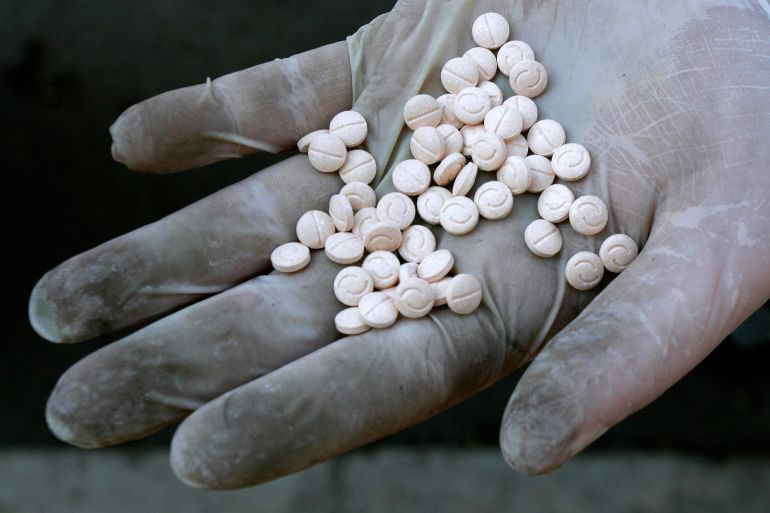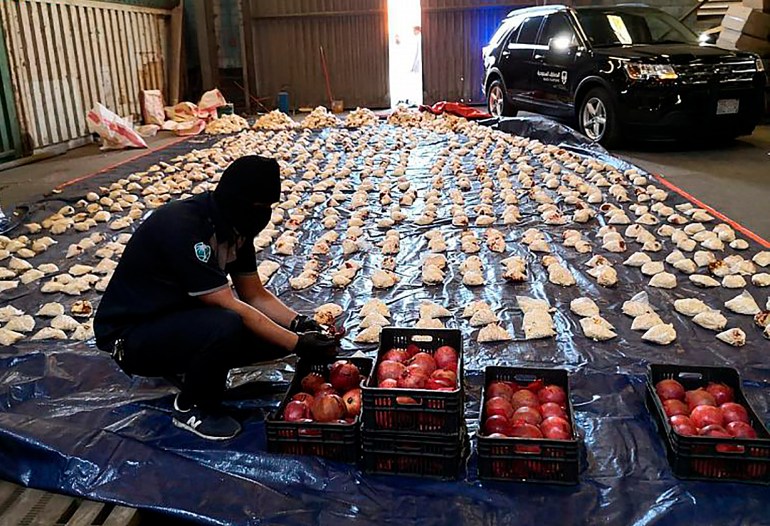Syria avoids regional cold shoulder despite Captagon drug trade
Billions of dollars go to the Syrian government, according to experts, leaving it at the centre of the amphetamine’s trade.

In Iraq’s western Anbar province, authorities made a new drug bust at the end of February, seizing 80kg (176lb) of the narcotic Captagon.
It is just the latest seizure of the Middle East’s budget amphetamine of choice in Iraq, and in a region that lies just across the border from Syria, where the regime of President Bashar al-Assad has increasingly come to rely on the manufacture and export of the drug as an illicit source of funding in an economy devastated by war.
Keep reading
list of 3 itemsIran launches missile strikes in Iraq and Syria citing security threats
Israeli army launches attacks on targets in Syria and Lebanon
Rising to international prominence in the 2010s after it reportedly became the drug of choice for ISIL (ISIS) fighters, Captagon was originally developed in the 1960s and often called the “poor man’s cocaine”.
By the 2000s, production had largely moved to the Middle East, where the drug’s quality varies almost as much as its customer base. In some of the more affluent regions of the region, Captagon is used by young people to add an illicit thrill to a weekend’s evening.
But for a taxi driver facing the prospect of another double shift, Captagon can mark the difference between making a rent payment or not.
The Syrian government has taken advantage of this market, according to experts and Western governments. Captagon has proven ideal for Damascus which, facing international isolation and the destruction of traditional tax-raising means, has turned to the drug trade.
The highly addictive narcotic can be manufactured quickly and has become a source of profit for individuals associated with the regime, with the business and economics website Syria Report noting that both the shrinking space for legitimate business as well as the expansion of the narcotics trade has effectively combined to make drug manufacturing the most important source of foreign currency in the country.
While Syria denies involvement in the Captagon trade, the United States, the European Union and the United Kingdom imposed sanctions last year on Syrian individuals, including two cousins of al-Assad, as well as others with close ties to the government and the military, in an attempt to target what the US estimated to have become “a billion-dollar illicit enterprise”. In its statement, the Council of the European Union was also explicit, stating that the trade in Captagon had become a “regime-led business model, enriching the inner circle of the regime and providing it with revenue that contributes to its ability to maintain its policies of repression against the civilian population”.
The war “has hit the regime tremendously, not simply directly as a result of the fighting and destruction, but also via sanctions and restrictions on dealing with the regime internationally”, said HA Hellyer, a Middle East security expert at the Carnegie Endowment for International Peace and the Royal United Services Institute.
“The Iranians and Russians have tried to ameliorate, but with limited success, and that’s impacted the regime generally as well as [al-]Assad’s clan in particular.”
The Syrian connection
Syria is a central node in the regional Captagon trade, with Caroline Rose, a director of the New Lines Institute’s Captagon Trade Project, explaining how pills are trafficked by units of the military’s Fourth Armoured Division from locations such as Deraa and Sweida in the south of the country overland to Iraq, or trafficked by the government’s allies, Hezbollah, into Lebanon.
While Hezbollah has denied involvement in the Captagon trade, there is growing evidence that the drug’s reach is expanding. In December, Jordanian forces exchanged fire with Syrian Captagon smugglers attempting to take advantage of heavy fog to rush the border, the second time in a single week.
“Globally, the Captagon trade is worth around $10bn. Of that, roughly $2.4bn went directly to the Syrian regime last year,” Rose said. “Little or nothing went to restructuring or the needs of the Syrian people.”
“We know that Assad is close to [Libyan renegade general] Khalifa Haftar, so there’s a lot of chat about the al-Assad regime using eastern Libya as a base. We’re also seeing a growing number of Captagon captures in countries across the coup belt,” Rose said, referring to the string of countries spanning Africa from Guinea to Sudan.
Alternatively, the narcotic finds its way from Syria to Europe, before being repackaged and directed to the Gulf, where customs officials are assumed to be less wary of shipments carrying EU or UK paperwork.
“We haven’t seen any fresh seizures in Europe for a few months now,” Andrew Cunningham, of the European Monitoring Centre for Drugs and Drug Addiction, said. “However, we know that transiting pills through Europe is still an important part of their network.”
“Captagon has generally failed to establish a market for itself within Europe,” he said of the drug, which has failed to compete against more accessible harder drugs in Europe and the omnipresent reach of alcohol.
“However, that’s not to say there aren’t manufacturing labs there. There have been a number of raids in the Netherlands, for example, but their output appears to have been destined for the Arabian Peninsula.”

Regional reintegration
However, despite international disquiet at Syria’s trade in narcotics, analysts suspect that regional actors may be placing concern over Captagon as secondary to enhancing regional unity, a trend exacerbated by the war in Gaza.
Last May, Syria was readmitted to the Arab League, going some way to rehabilitating the al-Assad regime, which had previously been shunned by most of the region for its years-long war against the country’s opposition, and the hundreds of thousands killed as a result.
“Israel’s war on Gaza and the resulting escalation within the region will have only impressed upon those regional powers the need not to escalate matters with the [al-]Assad regime,” Hellyer said.
While the shock waves from Israel’s war on Gaza reverberate around the world, often drawing stark dividing lines between ruler and ruled, in Syria, it may be offering the regime further respite from international censure.